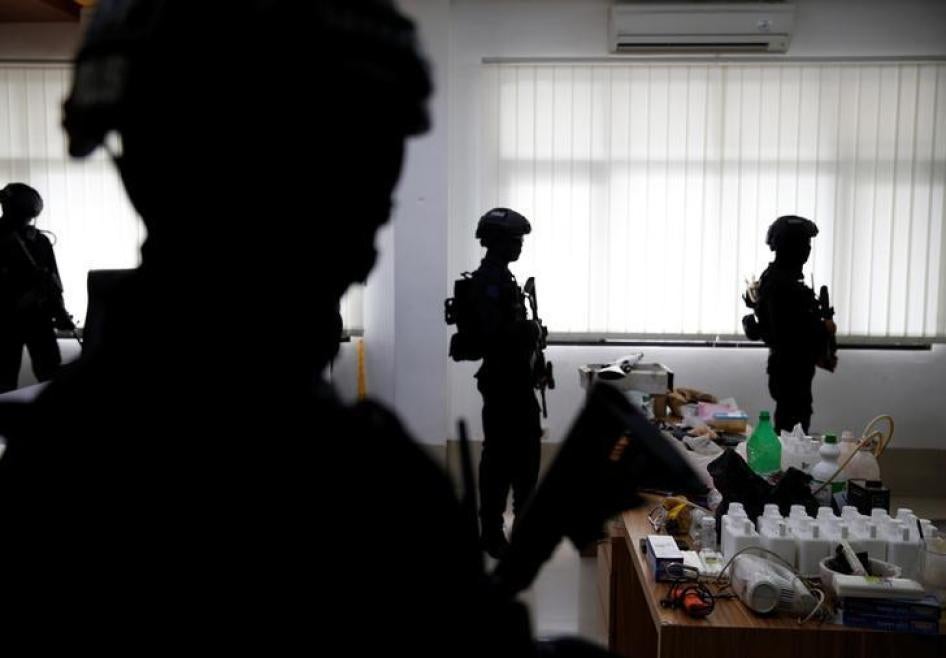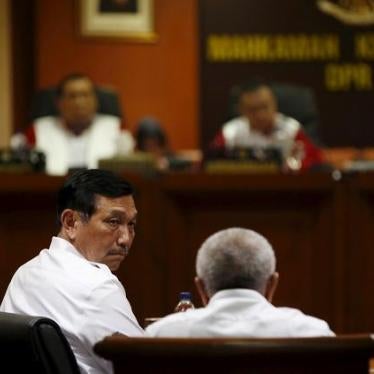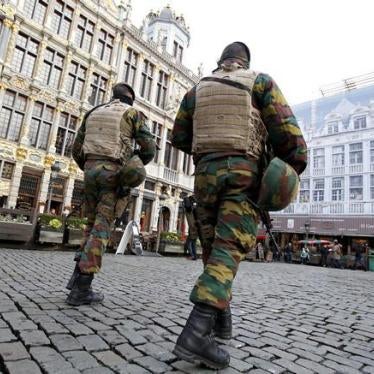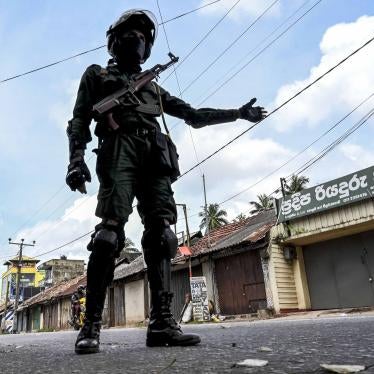(Jakarta) – Indonesia’s parliament should scrap proposed revisions to its counterterrorism law that are overbroad, vague, and would unjustifiably restrict basic rights, Human Rights Watch said today. The proposed amendments to Law No. 15/2003 on the Eradication of Terrorism would allow Indonesians to be stripped of their citizenship if suspected of traveling abroad to “join wars overseas in order to commit terrorism crimes,” and permit criminal penalties for any “speech, thought, behavior or writings” that could lead to “actions which adversely impact other people/communities.”
The open-ended language of the proposed revisions to the counterterrorism law will facilitate violations of the rights to free expression and nationality.
“The Indonesian government has legitimate concerns about terrorism, but disregarding basic rights will only undermine efforts to address the threat,” said Andreas Harsono, senior Indonesia researcher. “The government has an obligation to ensure that measures to protect public safety meet international standards.”
The Indonesian government initiated efforts to revise its counterterrorism law in 2016 as part of a government response to the January 14, 2016 bomb and gun attacks in central Jakarta that killed seven people, including five attackers allegedly linked to the armed extremist group Islamic State, also known as ISIS. Indonesian President Joko “Jokowi” Widodo said in early July 2017 that he would seek quick approval of the draft counterterrorism law in the wake of the fighting between Philippine security forces and Islamist militants in Marawi City in the Philippines. An unspecified number of Indonesian nationals are among the foreign fighters who have bolstered the militants’ ranks in Marawi. Indonesia shares a porous sea border with the Philippines that security forces in both Indonesia and the Philippines fear may enable an influx of armed Islamists to Indonesia once the fighting in Marawi ends.
Article 12B of the draft law permits the government to annul the citizenship of Indonesian citizens convicted of terrorist acts. It also contains ambiguous phrasing that could grant the security forces extremely broad power to detain and prosecute individuals for terrorism offenses. Article 13A provides for up to 12 years in prison for individuals whose “speeches, thoughts, behaviors or writings” inspire others to “commit violence, anarchy and other actions which adversely impact other people/communities,” without providing any clarification of those terms.
Article 6B criminalizes violence or threats of violence against “the environment” without providing any definition or clarification as to the meaning of “the environment.”
Article 43A permits police investigators or prosecutors to detain terrorism suspects in “certain locations” for a maximum period of six months. Members of the 18-member parliamentary working group responsible for the revisions have nicknamed that article “Pasal Guantanamo,” or the “Guantanamo Article,” in reference to the United States military prison at Guantanamo Bay, Cuba, where the US government has arbitrarily detained hundreds of people since 2002, virtually all without charge. The draft is unclear as to whether those “certain locations” will be secret or extremely isolated detention facilities – secret detention facilities greatly increase the risk of torture and ill-treatment of detainees.
The revisions would also allow for longer detention periods for terrorism suspects. The pre-charge detention for terrorism suspects would be extended to 21 days from the one day allowed for suspects accused of non-terrorism offenses under Indonesia’s Criminal Procedure Law. The total length of permissible detention of terrorism suspects from arrest through trial to final appeal would nearly double from the current maximum of 401 days to 781 days.
International law prohibits the arbitrary deprivation of citizenship. The Universal Declaration of Human Rights in article 15 provides that everyone has the right to a nationality and that no one shall be arbitrarily deprived of their nationality. The International Covenant on Civil and Political Rights (ICCPR,) which Indonesia has ratified, states in article 12: “No one shall be arbitrarily deprived of the right to enter his own country.” In 1999, the United Nations Human Rights Committee, the international expert body that interprets the ICCPR, stated that “the scope of ‘his own country’ is broader than the concept ‘country of his nationality,’” and that it would apply to people who have been stripped of their nationality in violation of international law.
Since 2006, the UN General Assembly has repeatedly reaffirmed that respect for human rights and fundamental freedoms are integral to its Global Counter-Terrorism Strategy, and recognized that violations of human rights and erosion of rule of law are conditions “conducive” to terrorism.
“Indonesia has a responsibility to protect its population from terrorist attacks, but the government needs to act in accordance with its international legal obligations,” Harsono said. “Indonesian government concerns about a spillover from the fighting in the Philippines don’t justify overbroad laws that excessively restrict fundamental rights and freedoms.”









